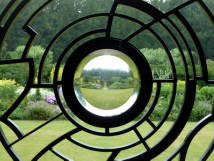
By this I mean our children don't go to school, we don't try to "recreate school in the home" (whatever that might mean), we don't follow a curriculum 180 days a year, and we don't do hybrids or anything like that.
What we do is live out a life of constant learning, inquiry, experiments, family field trips, business start ups, reading, growing, and observing in front of our sons.
Their father is always reading this thing or that, tinkering with mechanical things, hiking around in the woods, exploring, foraging, starting up a new small business, recycling for money, composting, gardening, working in the wood shop, or going to this sales call or that. They see him working and teaching himself new things and they see people come to consult with him about things they want to do. He takes them to interesting places and does good, memorable things with them.
They see me reading, fiddling around with sentences and grammar, writing, preparing talks, watching lectures, pawing through science books and gardening books and design books and physics books. I'm always squirreling around with language, math, history, and science. I will drive a long way to hear a good lecture. They watch me with young children and babies and I tell them what I see and how to observe.
Their father and I go to the opera and Shakespeare plays and museums and we really enjoy those things. We make big bonfires in the company of smart friends and we go on epic field trips. This is the norm at our house. They think, "this is how people are." And, really, most of our friends are this way, too. Even when we had no money--and we had NO Money--we managed to do these things.
They are surrounded by inquiry, conversation, initiative, curiosity, and humor. We also know that most of what we try will be more learning experience than overwhelming success, but we're good with that. Your home is probably a lot like this, too. Maybe you're visual artists or history reenactors or musicians or biologists or metalworkers or farmers or surveyors or doctors. But maybe you haven't thought of it in these terms.
The point is, this is what our children see. This is what they think is normal. Learning, experimenting, teaching yourself, observing others, finding resources, these are caught, not taught. Shakespeare, Rose Wilder Lane, Sam Maloof, Bach, Frank Lloyd Wright, Montessori, Rothbard, Brubeck, Beksvoort, Rand, Feynman, Hayek, Rossini. These and others are the 'soundtrack' of their lives. Taking them away from this for the sake of looking at a textbook or filling in a worksheet they have no interest in makes no sense. It is a step down.
But this isn't all. They observe us, they take this in, they construct themselves with these things they find in their environment. But we observe them, we figure out what they're good at and we feed it. We really feed it. We figure out how. We make sacrifices. We make trades. We ask for help. They spend 80% of their time in their sweet spot. In the part of their lives where they are monumental and fierce and strong. And we help them and push them and encourage them to become and create and magnify in the places where they are naturally strong. It is a pleasure and an honor to be the assistant in each boy's work. They are building and crafting and laboring. They are creating edifices that we could not create. That we would not have known to create. Good. This is solidly good.
And as they create, they draw adults to themselves. They go places children do not usually go and participate in ways children do not usually participate. This draws mentors to them. People who want to help. And this is the part a lot of people don't get. Those mentors are key to this way of being with children. They can be found at community colleges, toastmasters meetings, museums, lecture series, music class, language lessons, the auto repair shop, the feed and seed. They're everywhere. Your children need them. Find them. Bring them into your circle. They are honored guests in your lives. They will want to share with you if you are interested in what they have to share. Invite them for coffee. Invite the for dinner. Bring them into your circle now. Not later. Make intellectual community. Make an intellectual nest for your children and let these people be a big part of their lives and treat the like the important people that they are.
So when I say we unschool, this is what I mean.
 RSS Feed
RSS Feed